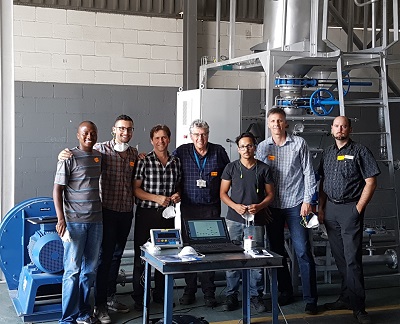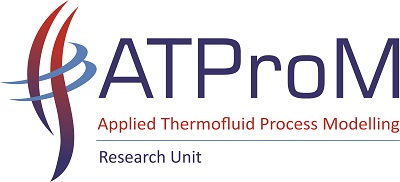UCT and Eskom partnership brings change in the energy sector

A new research group, the Applied Thermo Fluid Process Modelling Research Unit (ATProM), is building on an existing collaboration between the University of Cape Town (UCT) and Eskom to provide engineers with up-to-date research, students with real-world experience and solutions to some of the challenges facing ageing energy infrastructure in South Africa.

Left to right: Excellent Gwebu (UCT Student), Geoff Raikes (UCT Student), Eddie Raad (CFW Industries), Professor Louis Jestin (EPPEI Director), Colin du Sart (EPPEI Student), Professors Pieter Rousseau and Wim Fuls
A sector in crisis
UCT’s Mechanical Engineering Professor Wim Fuls, one of the heads of the newly created ATProM says: “Right now, in South Africa we have not only lost a lot of experience and knowledge but it is also a very tough time for capital intensive entities like Eskom to operate. Financial pressures cause severe delays in necessary maintenance and future strategic investment, and long-term plans get replaced by short term crisis management in an attempt to keep up with a very volatile energy market due to environmental and other commercial pressures.”
In light of these challenges, he believes the creation of ATProM could not have come at a better time. “ATProM is ideally suited to provide Eskom with skilled engineers who fundamentally understand the thermal process of a power plant. I feel we can make substantial contributions into answering some of the current challenges that Eskom faces, such as operation at low load, or rapid plant turn-down. On the on-line condition monitoring we will be contributing in algorithm development and other interventions which will enable Eskom to operate plants with better foresight into when and how components might deteriorate and require maintenance.”

What is ATProM?
ATProM was officially accredited at the end of 2017 with the mandate to “focus on the application of the fundamental principles of fluid mechanics, thermodynamics and heat and mass transfer to model industrial processes”.
What does this mean in layperson’s terms? According to Priyesh Gosai, Manager of ATProM, having access to representative models allows engineers to analyse the operation and performance of individual components, sub-systems or complete integrated plants to improve the design and operation to meet changing consumer demands. “It also means they can better detect changes that might indicate impending equipment or process degradation, thereby enabling preventative planned maintenance outages,” he says.
UCT Professor Pieter Rousseau, the other founding member of ATProM, explains that the research aims of the unit include the development of a high-fidelity power plant engineering simulator. “This can serve as a platform for various other process related studies,” he says. “The unit is also working on network-based process models which can be applied in studying the effects of low load as well as varying load operation in coal fired power plants and monitoring methods to advance on-line process condition monitoring associated with the major systems, sub-systems and components of coal-fired power plants.”
Training through research
ATProM believes that research in this field will not only contribute to reduced operating costs and understanding how to improve the flexibility of coal fired power plants with the increased uptake of renewable energy onto the grid, but will also result in skills development.
Says Rousseau: “ATProM strives to do applied research as opposed to basic research. Whereas basic research is directed towards better understanding of the fundamental aspects of phenomena, our work is driven by the fundamental principles but framed by and aimed at real-world applications. This creates the perfect opportunity for “training through research” by enhancing and expanding the knowledge, skills and tools of process engineering practitioners, including the Eskom engineers who make up a large part of our postgraduate student body. We are also very much involved in the development and presentation of the new Postgraduate Diploma in Power Plant Engineering that is now offered at UCT.”
From Eskom’s point of view, one of the key aims of this collaboration is to bridge the current skills gap within the utility by sending engineers to universities to conduct applied research within the power industry space. Kapil Sukhnandan, the Industrial Coordinator between Eskom and ATProM, explains: “Engineers return to Eskom with the required qualifications, leadership thinking and skills to make a positive impact to the Eskom engineering business in terms of operational sustainability, design challenges and application of new technologies. This collaboration also aids Eskom in having direct access to expert academics to assist with its immediate operational challenges that come up.”
According to Gosai, 20 students have graduated to date, a feat that would have been impossible without Eskom’s support. One such former student is Mu’azzam Kippie who is currently working as an electrical engineer for Eskom. He conducted research on optimising the opening characteristics of the guide vanes of a hydro power station in relation to the power output. “Guide vanes are like ‘valves’ to control the water flow to the turbine. Opening or closing it has the effect of increasing or decreasing the power output,” he explains. He found the experience of being able to call on the real world experience of Eskom engineers to be invaluable. “Getting hold of real world data is not an easy task but being affiliated with Eskom helped a lot in that regard. The practical experience of the engineers and historical data could be used for verification,” he said.
Willie Le Grange, who completed his thesis on developing computerised models of a coal fired power station network’s main components, describes the interaction with Eskom engineers as one of the highlight of his degree. “Being able to have regular talks with the Eskom engineers on the inner workings of a power station gave that edge of being able to successfully complete the degree. The academic world has a lot of solutions but sometimes the implementation or focus of these solutions can be vague. The collaboration between UCT and Eskom enables us to regularly shift the focus of the solutions to have a meaningful and lasting impact on today’s energy problems.”
In 2015 Whitney Monnaemang conducted her dissertation on the methodology of calculating heat transfer inside a boiler in order to predict exit temperatures. Monnaemang, who is now employed as an engineer at a consulting company, also found the experience of having access to real-world data useful. “At the time we even visited one of Eskom’s power plants so we could see the components we were investigating in real life,” she says.
A public private partnership
ATProM is the latest development in a long-standing collaboration between Eskom and UCT. Eskom first funded the establishment of the Eskom Specialisation Centre in Energy Efficiency as a part of the Eskom Power Plant Engineering Institute (EPPEI) programme in 2012. “This programme aims to train engineers in the power sector through research and course-based training,” Gosai explains. “The Department of Mechanical Engineering then recruited Professors Wim Fuls and Pieter Rousseau, who have built UCT’s collective competency in process modelling for coal fired power plants. ATProM is the next step in our partnership.”
Future hopes
Head of the EPPEI at UCT, Louis Jestin, believes that ATProM has a critical role to play in better understanding the physically processes of power generation. “Having access to these models allows for better planning and greater flexibility,” he says. “But the most important aspect is the training of engineers. It is my hope that through ATProM we can one day count our graduates in the thousands.”